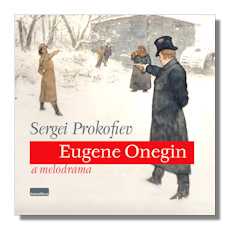
The Internet's Premier Classical Music Source
Related Links
- Prokofieff Reviews
- Latest Reviews
- More Reviews
-
By Composer
-
Collections
DVD & Blu-ray
Books
Concert Reviews
Articles/Interviews
Software
Audio
Search Amazon
Recommended Links
Site News
 CD Review
CD Review
Serge Prokofieff

Eugene Onegin
- Narrator - Jaromír Meduna
- Onegin - Petr Mikeska
- Tatiana - Karolína Herzinová
- Lensky - Tomáš Vaněk
- Nurse/Mother - Marta Hrachovinová
- Neighbor/Prince - Jiří Klem
Štěpánka Skalická & Jan Dušek, harpsichord
The North Czech Philharmonic Teplice/Jiří Petrdlík
Director of Spoken Word - Dr. Věra Šustíková
Recorded Live at the Ludwig van Beethoven Festival in Teplice, Czechoslovakia on May 29, 2014
ArcoDiva UP0167-2 74:36
Prokofiev's score for the stage drama Eugene Onegin has a confusing and unlucky history. Prokofiev wrote forty-four numbers for what would have been a massive production involving singers, dancers chorus, actors and narrator. The project was scheduled to coincide with the 1937 centenary of Alexander Pushkin's death. But it was abruptly canceled for reasons never actually made clear, though undoubtedly they were related to politics, which is to say, to the whims of Stalin, who in 1936 severely condemned Shostakovich's opera Lady Macbeth of the Mtsensk District and subsequently cracked down on composers and others in the arts. At any rate, Prokofiev's music was left in piano score with detailed indications for its orchestration.
The work is chock full of some of Prokofiev's most memorable melodies, and listeners encountering Eugene Onegin for the first time may recognize many of those tunes: Prokofiev reused a good portion of them in the scores for War and Peace, Cinderella, the 8th Piano Sonata, and the 7th Symphony. The work is simply gorgeous, and had the production gone forward, Prokofiev would certainly have made a suite or several suites or even a cantata from the piece. In any event, following cancellation the Eugene Onegin manuscript merely collected dust in a drawer until 1973 when Elizaveta Dattel, a prominent Soviet musicologist, discovered it and, with the aid of G. Zinger, orchestrated the music. But the score was missing three numbers, which soon turned up at an auction at Christie's in London. Conductor Sir Edward Downes obtained the manuscript there and then made an arrangement of the entire score.
Arranging Prokofiev was not new to Downes: the composer's first opera, Maddalena, was left unorchestrated except for the first scene, but Downes finished the orchestration and the work was posthumously premiered in a 1979 performance led by Gennady Rozhdestvensky. He and several others and have since recorded it. Downes led the first complete performance of Eugene Onegin and recorded it for Chandos in 1994. I reviewed Downes' recording of Eugene Onegin incidental music here when it was reissued back in 2009 (Chandos CHAN10541) and found it quite good, but I was dubious about the plentiful narration and dialogue that were often spoken over the music.
That's the case involving the spoken text here in this recording on ArcoDiva. However, the conductor Jiří Petrdlík draws fine playing from the North Czech Philharmonic Orchestra Teplice, and the actors and narrator seem to put their heart and soul into the work. That's all to the good, but there's a problem, at least for English speakers: the language used is Czech! This recording derives from a live performance at the Ludwig van Beethoven Festival in Teplice, Czechoslovakia, on May 29, 2014. It does not contain all the music that Prokofiev wrote, as the Downes version does. Downes on Chandos is on two discs at 74:05 and 50:06. As the heading indicates this effort on ArcoDiva clocks in at 74:36. The album notes acknowledge that cuts are made in this version: ballet and choral sections are eliminated, and so are solo vocal numbers. That noted, I can say that in the twenty tracks here the most important music from the score is included. What is probably a more crucial factor for potential buyers is the primacy of the spoken text: it is not only spoken over the music in many passages but is often presented with no music at all for long sections. The lengthier and also verbose Chandos version has the advantage of a text in English. The Vladimir Ponkin performance (Russian Season LDC288027/28) features most of the music and no narration or dialogue at all, and the performance is very good. Michail Jurowski (Capriccio 7001) features most of the music, fine performances, and a spoken text that, thankfully, is less intrusive than in either the Chandos or ArcoDiva versions.
As for other issues here, the sound reproduction on this ArcoDiva effort is very vivid, and a synopsis of the story is given in the album booklet along with informative notes and performer biographies. So, there you have it: this is an undeniably fine production and performance, but one that many may find problematic because of the considerable spoken text.
Copyright © 2015, Robert Cummings




















